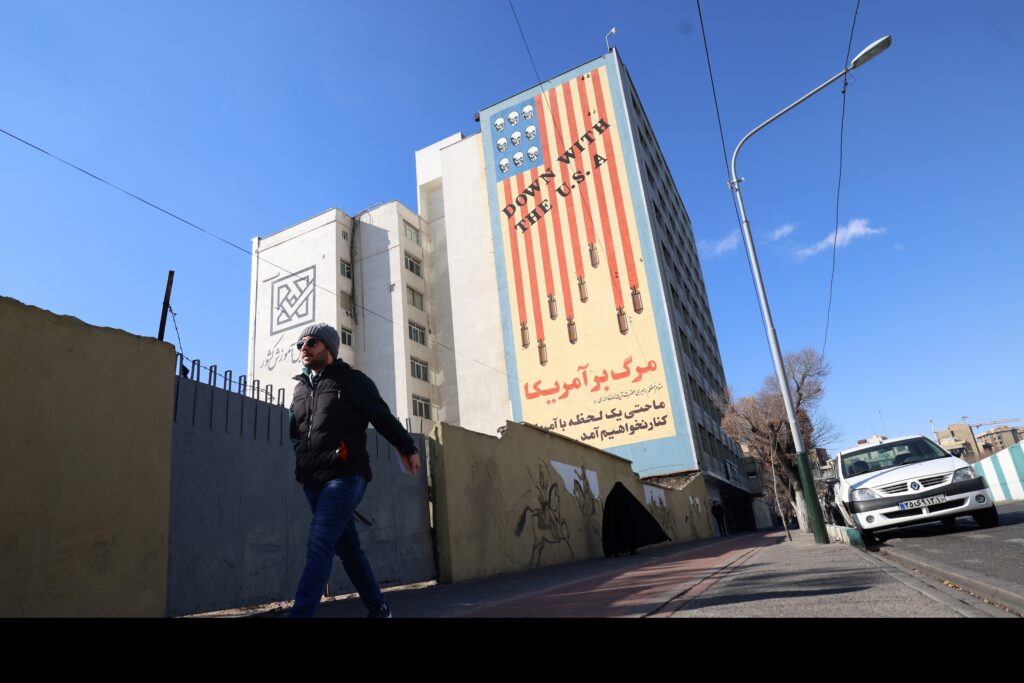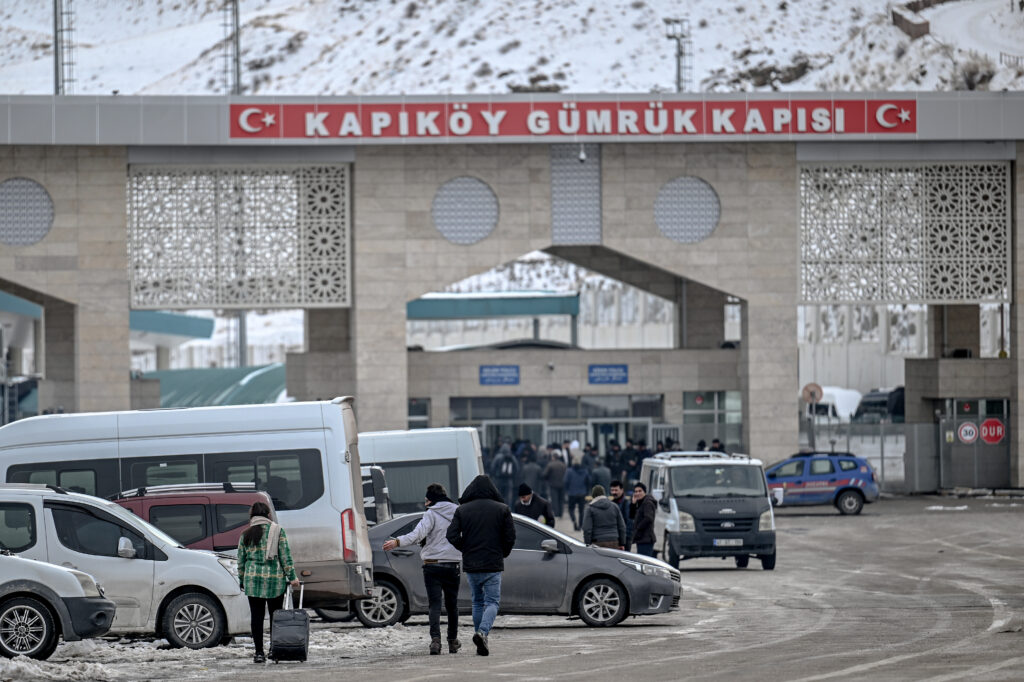L’Iran parle de “progrès” en vue de négociations avec Washington
Un haut dirigeant iranien a fait état samedi de “progrès” en vue de “négociations” avec Washington, nouveau rebondissement dans un contexte tendu alimenté depuis plusieurs jours par les déclarations belliqueuses de part et d’autre.”Contrairement à la propagande de guerre artificiellement créée par les médias, la mise en place d’un cadre de négociation progresse”, a écrit en persan sur X Ali Larijani, secrétaire de la plus haute instance de sécurité en Iran, qui avait été reçu la veille à Moscou par le président russe Vladimir Poutine.Cette déclaration intervient alors que le président américain Donald Trump avait affirmé vendredi que l’Iran voulait “conclure un accord” sur le nucléaire, ajoutant qu’il avait fixé à Téhéran un ultimatum sans donner plus de détails.Elle fait aussi suite à d’autres propos, nettement plus offensifs, tenus par le chef de l’armée iranienne Amir Hatami, selon lequel les forces armées iraniennes sont “en état d’alerte maximale” face à une éventuelle attaque américaine.Depuis la vague de contestation réprimée début janvier dans le sang par le pouvoir iranien, Donald Trump a multiplié les avertissements tout en soufflant le chaud et le froid, et a déployé une dizaine de navires dans le Golfe, dont le porte-avions Abraham Lincoln.Ces menaces entretiennent un climat de fébrilité en Iran. Une explosion survenue samedi dans un immeuble résidentiel de Bandar Abbas, un port du sud de l’Iran sur le Golfe, est restée inexpliquée plusieurs heures avant que les pompiers annoncent qu’il s’agissait d’une fuite de gaz.Des incidents distincts ont été rapportés ailleurs dans le pays mais les médias ont rapidement écarté tout lien avec une attaque américaine.Une rumeur affirmant que le chef des forces navales des Gardiens de la Révolution avait été assassiné a par ailleurs largement circulé sur les réseaux sociaux, a rapporté l’agence Tasnim, l’attribuant à “une opération psychologique” menée par des “courants anti-Iran”.- Exercice naval -Tout en se disant ouvert au dialogue, l’Iran, “doigt sur la gâchette”, a déjà averti que de “nombreuses” bases américaines dans la région se trouvaient à portée de missiles iraniens. Il a également menacé de bloquer le détroit d’Ormuz, point de transit clé pour les approvisionnements énergétiques mondiaux.Les Gardiens de la Révolution vont y mener à partir de dimanche “un exercice naval de tir réel de deux jours”, a indiqué le Commandement militaire américain pour le Moyen-Orient (Centcom), mettant en garde contre “tout comportement dangereux” à proximité des forces américaines.Pour autant, le chef de la diplomatie, Abbas Araghchi, n’avait pas exclu vendredi de participer à des discussions si elles étaient “justes et équitables”, répétant que son pays n’avait “jamais cherché à se doter de l’arme nucléaire”.Il a cependant ajouté que les capacités de défense et les missiles de son pays “ne feraient jamais l’objet de négociations”.- Khamenei prie à Téhéran -Les pays du Golfe appellent à la retenue, tout comme la Turquie voisine. A la frontière, une Iranienne qui vient de quitter son pays se prend à espérer une “intervention extérieure”. “Ils en ont tués tellement… Nous prions pour que l’Amérique nous attaque, voilà où nous en sommes”, lâche cette quinquagénaire, interrogée par l’AFP.La pression est aussi montée ces derniers jours avec l’inscription par l’UE sur la liste des “organisations terroristes” des Gardiens de la Révolution, l’armée idéologique de la République islamique accusée d’avoir orchestré la répression des manifestations. Une décision qualifiée d'”insensée” par Téhéran.Alors que des analystes n’excluent pas le fait que les Etats-Unis veuillent éliminer les plus hauts dirigeants iraniens, le guide suprême, l’ayatollah Ali Khamenei, a visité samedi le mausolée de Rouhollah Khomeini, le fondateur de la République islamique, dans le sud de Téhéran.Dans des images publiées sur son site officiel, M. Khamenei, qui ne s’était pas montré en public depuis le 17 janvier, apparaît en train de prier.Sorti affaibli de la guerre de juin 2025, le pouvoir iranien a étouffé les récentes manifestations, initialement contre le coût de la vie, mais qui se sont transformées en défi au pouvoir.Plus de 6.500 personnes, dont 6.170 manifestants et 124 enfants, ont été tuées en Iran, d’après un bilan actualisé de l’ONG Human Rights Activists News Agency (HRANA), dont le siège est aux Etats-Unis et qui enquête sur plus de 17.000 décès potentiels supplémentaires. Les autorités iraniennes reconnaissent que des milliers de personnes ont été tuées lors des manifestations, mais affirment que la grande majorité étaient des forces de sécurité ou passants tués par des “émeutiers”.
Danemark: 10.000 personnes défilent pour dénoncer les propos de Trump sur l’Afghanistan
Au moins 10.000 personnes, selon la police, ont participé samedi à Copenhague par un froid glacial à une marche silencieuse, à l’appel de l’Association danoise des anciens combattants, pour dénoncer les propos de Donald Trump relativisant l’engagement des alliés des Américains en Afghanistan.Le président américain a déclenché l’indignation du Danemark et d’autres pays alliés le …
Danemark: 10.000 personnes défilent pour dénoncer les propos de Trump sur l’Afghanistan Read More »
A la frontière turque, des Iraniens appellent les Etats-Unis à l’aide contre les mollahs
“Ils en ont tués tellement… Nous prions pour que l’Amérique nous attaque, voilà où nous en sommes”.La quinquagénaire vient tout juste de poser son sac au poste-frontière de Kapiköy qui la sépare de l’Iran, son pays, dans l’est de la Turquie, que ses premiers mots sont pour espérer une “intervention extérieure”: “A l’intérieur de l’Iran, …
A la frontière turque, des Iraniens appellent les Etats-Unis à l’aide contre les mollahs Read More »
Kishan, Arshdeep star as India down New Zealand in T20 finale
Ishan Kishan hit his maiden T20 international century and Arshdeep Singh took five wickets as India thrashed New Zealand by 46 runs to seal the series 4-1 on Saturday.Kishan struck 103 off 43 balls as India posted 271-5 in Thiruvananthapuram after they elected to bat first in their final game ahead of the T20 World Cup starting next weekend.India, who are number one in the T20 rankings, bowled out New Zealand for 225 despite a 38-ball 80 by opener Finn Allen.Left-arm quick Arshdeep picked up his first five-wicket haul in T20 matches for India, taking 5-51. Left-arm spinner Axar Patel took three wickets.Arshdeep went for 40 runs and took one wicket in his first two overs but later gained his revenge.Allen and Rachin Ravindra put on 100 runs for the second wicket before the wheels soon came off for New Zealand as Allen departed.Arshdeep made further inroads with two wickets in an over including Ravindra, for 30, and skipper Mitchell Santner, for a duck.Ish Sodhi hit a valiant 33 off 15 balls before he fell as the last wicket with New Zealand bowled out in 19.4 overs.Earlier, India lost local boy Sanju Samson for six before Kishan took matters into his own hands in a 137-run third-wicket partnership with skipper Suryakumar Yadav, who hit 63.Kishan took on leg-spinner Sodhi as he blasted four fours and two sixes in a 29-run 12th over. Suryakumar then reached his third fifty of the series with two successive sixes.Spinner Santner took down his opposite number when he had Suryakumar stumped, but Kishan raised his hundred off 42 balls with a six, jumping for joy as he soaked up the applause from the fans and dressing room.Kishan had been dropped by Glenn Phillips in the deep on 84, and eventually fell to Jacob Duffy — ending a knock featuring six fours and 10 sixes. Hardik Pandya kept up the charge though with a 17-ball 42 as India hammered 169 runs off the last 10 overs.India will begin their T20 World Cup title defence next Saturday when they play the United States in Mumbai.




